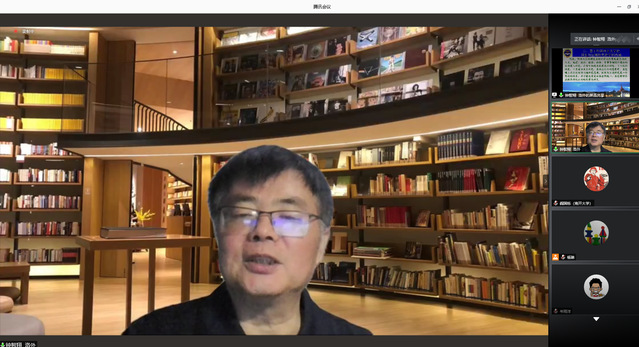
On the evening of October 27th, Professor Zhong Zhixiang from Information Engineering Universityvisited the Center of International and Regional Studies in Nankai University. Professor Zhong is now the president of Chinese Non-universal Foreign Languages Teaching Research Association, member of Foreign Language Disciplines Appraisal Group of Academic Degrees Committee of the State Council, Deputy Director of Non-universal Foreign Languages Committee under the Advisory Committee of Foreign Language Teaching of the Ministry of Education, an expert received State Council special allowance and a doctoral supervisor. During his visit, he gave a lecture entitled “The Discipline Construction of International and Regional Studies Based on Foreign Language Disciplines and Talent Cultivation.” This online lecture was hosted by Professor Yan Guodong, dean of the College of Foreign Languages and director of the Center of International and Regional Studies in Nankai University. More than 150 teachers and students from Nankai University and other universities actively participated in this event.
In the lecture, Professor Zhong mainly demonstrated the discipline construction of “international and regional studies” based on foreign language disciplines and talent cultivation from five aspects.
Firstly, Professor Zhong pointed out that the reason for establishing international and regional studies as one of research directions under the first-level discipline—Foreign Language and Literature—was mainly to meet the demand of China’s opening to the outside world and major-country diplomacy, the need of foreign language disciplines’ development and the requirements of expanding the cultivation goals of talents in foreign languages in the new era.
Besides, Professor Zhong elaborated the discipline connotation of international and regional studies based on the subject of foreign language and literature, emphasizing the necessity in its interdisciplinary attribute, alongside its instrumental and humanistic properties as a discipline of foreign languages. Professor Zhong put forward that international and regional studies, like “longitude and latitude crossing each other”, was the intersection of geographical space and discipline direction. Its research field was an open system that included both introductory research and specialized research. He suggested universities and research institutions should give full play to their advantages and characteristics in this area.
When mentioning the disciplinary differences between foreign languages and other subjects in national and regional studies, Professor Zhong analyzed it from perspectives of research targets, contents, and methodologies, pointing out the distinctive advantages of doing research in international and regional studies under disciplines of foreign languages.
Furthermore, in order to facilitate the discipline construction of international and regional studies based on the first-level discipline of foreign languages, Professor Zhong offered practical suggestions to the constructions of discipline system, academic system, service system, and cultural inheritance system.
Finally, Professor Zhong discussed the selection of research topics in international and regional studies, putting forward relevant principles and examples. He showed high-frequency words in the research of international issues supported by National Social Science Foundation, and encouraged teachers and scholars in this field to discover, ponder, and attempt to solve the problems.
This academic lecture was substantial in content. Professor Zhong Zhixiang benefited the participants a lot with his clear and vivid elaboration which aroused heated discussions. He also gave detailed answers to attendees’ questions.
After the lecture, dean of the college Yan Guodong expressed his sincere thanks to Professor Zhong Zhixiang. He agreed with Professor Zhong that foreign language disciplines possessed great advantages in international and regional studies. Therefore, it should be more active and deeply involved in solving China’s significant academic problems, and form a complementary and mutually fostered relationship with other disciplines so as to promote the further development of international and regional studies.
Finally, both professors offered suggestions on how to give a better play to the abilities and advantages of foreign language teachers. They encouraged the participants and looked forward to further improvement of the discipline construction of foreign language and literature in international and regional studies, and to the talent cultivation mechanism’s keeping pace with the times.



